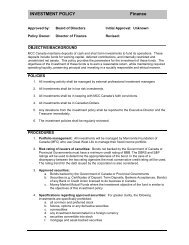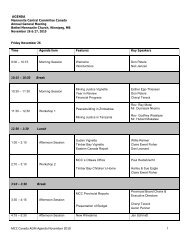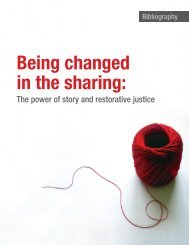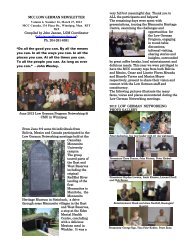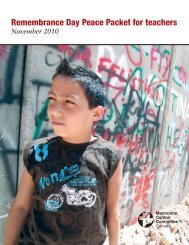Walking together: Healing and hope for Colombian refugees
Walking together: Healing and hope for Colombian refugees
Walking together: Healing and hope for Colombian refugees
Create successful ePaper yourself
Turn your PDF publications into a flip-book with our unique Google optimized e-Paper software.
w a l k i n g<br />
t o g e t h e r<br />
41<br />
questions. <strong>Colombian</strong>s have many different ways to ask this question, <strong>and</strong> often use them one after<br />
another. 2) Questions about how family members are doing. 3) Comments about physical appearance,<br />
which sometimes include allusions to one’s weight, generally intended as a complement on one’s<br />
healthy look.<br />
Communication style: As previously mentioned, <strong>Colombian</strong>s are much more indirect than Canadians,<br />
<strong>and</strong> a very direct communication style is often considered offensive. This indirect communication style<br />
is intended to protect relationships. For Canadians that are used to a direct communication style, the<br />
value of indirect communication <strong>for</strong> protecting relationships can be hard to grasp at first. For instance, <strong>for</strong><br />
<strong>Colombian</strong>s, “I’ll see if I can do it” or “I’ll try” will almost always mean “no.” While Canadians may interpret<br />
this answer as insincere or dishonest, <strong>for</strong> <strong>Colombian</strong>s it is just the opposite. Answering “I’ll try” is simply<br />
a way to soften the harsh “no” imbedded within their answer, which in itself would be offensive. Other<br />
<strong>Colombian</strong>s will underst<strong>and</strong> exactly what is meant, <strong>and</strong> not be offended. However, when one responds<br />
“I’ll try” to the request of a person who is truly in need, the “I’ll try” will likely be understood as genuine.<br />
These dynamics can be confusing - reading body language <strong>and</strong> context is important. Another example<br />
is that <strong>Colombian</strong>s may talk about making plans with friends or acquaintances with no immediate<br />
or specific intention of actually doing so. It is more important to be polite <strong>and</strong> show interest in the<br />
relationship by sounding like you really would like to get <strong>together</strong> rather than to say “I can’t” or “I don’t<br />
think it will work out.” Likewise, it is more acceptable to cancel out on plans at the last minute in Colombia<br />
than in Canada. For a <strong>Colombian</strong>, “I’ll call you later” is often just a platitude while <strong>for</strong> a Canadian it is a<br />
promise.<br />
Although indirect, <strong>Colombian</strong>s can become very animated while talking. Don’t confuse this animation<br />
with aggression, it isn’t the same thing.<br />
Confrontation is avoided at all costs. If a friend has made a mistake <strong>Colombian</strong>s will not expose it publicly,<br />
as that would cause public embarrassment <strong>and</strong> a ruined relationship.<br />
Personal space: <strong>Colombian</strong>s are com<strong>for</strong>table with much less personal space than Canadians. While it is<br />
common <strong>for</strong> <strong>Colombian</strong>s to st<strong>and</strong> or sit as little as one foot apart while conversing, most Canadians will<br />
find this uncom<strong>for</strong>tably close. It would be unusual <strong>for</strong> <strong>Colombian</strong>s to choose to sit across the room from<br />
one another <strong>for</strong> the purposes of a good visit. In the context of Canadian personal space <strong>Colombian</strong>s may<br />
feel uncom<strong>for</strong>tably far away from one another.<br />
In conversations is is common <strong>for</strong> physical contact to take place. To reach out <strong>and</strong> touch the arm or<br />
shoulder or even h<strong>and</strong> of the person you are talking with is common, especially between women.<br />
The concept of “what is yours is also mine” is commonly held in Colombia between friends <strong>and</strong> family<br />
members, <strong>and</strong> borrowing of clothes or other items may take place without asking <strong>for</strong> prior permission.<br />
As an example, <strong>Colombian</strong>s tend to be more com<strong>for</strong>table than Canadians when it comes to drinking out<br />
of the same bottle or even eating utensils.



